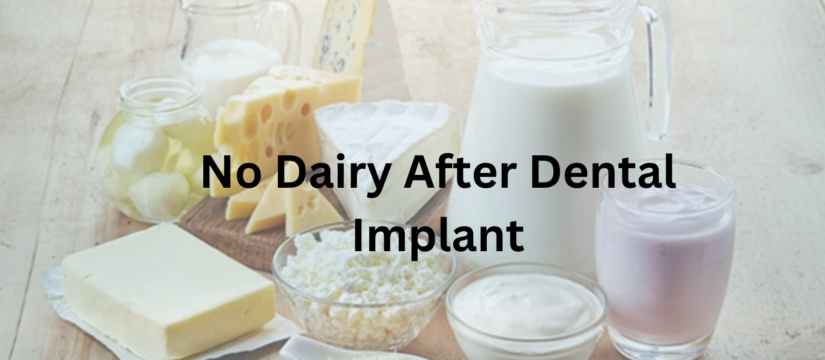
A Friendly Guide to Help You Heal Comfortably
Recovering from a dental implant procedure can bring many questions, and one common concern is dietary restrictions. If you’ve been advised to avoid dairy, you may be wondering why and what alternatives will support your healing. Finding the right foods can make a difference in how smoothly you recover. Whether you’re looking for guidance on nutrition or expert care, Dental Implants Rockville MD specialists provide personalized treatment plans for optimal results.
Understanding the reasons behind these guidelines can make your healing journey easier. Let’s explore why no dairy after dental implant is recommended and which foods will help you heal comfortably.
Why No Dairy After Dental Implant?
Dairy products, including milk, yogurt, cheese, and butter, are often considered nutritious and beneficial. However, they can interfere with the healing process after a dental implant. Here’s why:
1. Increased Risk of Infection
Dairy products promote the growth of bacteria in the mouth. After an implant procedure, the surgical site is vulnerable to infection. Consuming dairy can introduce additional bacteria, increasing the likelihood of complications.
2. Potential for Inflammation and Discomfort
Milk proteins can sometimes trigger mild inflammatory responses in some individuals. This inflammation may slow healing and increase post-surgical discomfort.
3. Dairy Can Cause Mucus Production
Dairy products can stimulate excess mucus production in some people. This additional mucus can lead to throat discomfort, increased phlegm, and a sensation of congestion, making it uncomfortable to swallow.
4. Dairy and Nausea
Some individuals experience nausea after oral surgery, particularly if they have been prescribed antibiotics or pain medication. Dairy can sometimes worsen nausea, leading to further discomfort.
Best Foods to Eat Instead
Now that we’ve covered why no dairy after a dental implant is recommended, let’s focus on foods that support a healthy recovery. The goal is to choose soft, nutrient-dense options that promote healing while being gentle on your mouth. Dentist Rockville MD recommends making thoughtful food choices to aid the healing process.
1. Protein-Rich Soft Foods
Protein plays a crucial role in tissue repair and healing. Since chewing may be uncomfortable, opt for soft protein sources like:
- Scrambled or soft-boiled eggs
- Mashed beans and lentils
- Tofu
- Soft fish like salmon
2. Cooked Vegetables
Vegetables provide essential vitamins and minerals that help with healing. Choose cooked or steamed options that are soft and easy to chew, such as:
- Mashed sweet potatoes
- Steamed carrots
- Cooked zucchini
3. Healthy Carbohydrates
Carbohydrates provide energy, which is essential for the healing process. Choose soft and easy-to-eat options like:
- Oatmeal
- Mashed bananas
- Cooked quinoa
4. Non-Dairy Calcium Sources
Since dairy is off-limits, you can still get calcium from other sources to support bone healing:
- Almond milk (unsweetened)
- Cooked spinach
- Soft tofu
5. Hydrating Foods and Fluids
Staying hydrated is essential for recovery. Choose soothing options such as:
- Herbal teas (lukewarm, not hot)
- Smoothies with non-dairy milk
- Blended soups
Additional Tips for a Smooth Recovery
Healing after a dental implant procedure involves more than just food choices. Follow these guidelines to ensure a smooth recovery:
1. Avoid Hard or Crunchy Foods
Until the implant site has healed, avoid nuts, chips, and raw vegetables that require excessive chewing.
2. Stick to Lukewarm Foods
Extremely hot or cold foods can cause sensitivity and discomfort. Room temperature or slightly warm meals are best.
3. Maintain Good Oral Hygiene
Follow your dentist’s post-surgical care instructions, including gentle rinsing and keeping the implant site clean.
4. Rest and Follow Your Dentist’s Recommendations
Giving your body time to heal is essential. Avoid strenuous activities and keep follow-up appointments to ensure proper healing.
What to Expect During Recovery
After a dental implant procedure, mild swelling, tenderness, and slight bleeding are normal. Most patients can return to regular activities within a few days, but full recovery takes a few months as the implant integrates with the jawbone. If you experience persistent pain, unusual swelling, or signs of infection, contact your dentist right away.
A Comfortable and Successful Recovery
Healing after a dental implant procedure doesn’t have to be stressful. Avoiding dairy, choosing the right foods, and following your dentist’s advice will help ensure a smooth and successful recovery. If you have any questions or concerns, we are here to help. Schedule an appointment with our team for expert guidance tailored to your needs.
Your comfort and well-being matter. Let’s make your journey to a confident smile as easy as possible!

